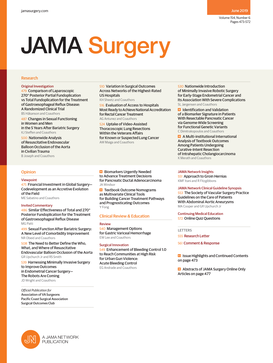Benzodiazepine-Free Cardiac Anesthesia for Reduction of Postoperative Delirium: A Cluster Randomized Crossover Trial.
IF 15.7
1区 医学
Q1 SURGERY
引用次数: 0
Abstract
Importance Delirium is common after cardiac surgery and associated with adverse outcomes. Intraoperative benzodiazepines may increase postoperative delirium but restricting intraoperative benzodiazepines has not yet been evaluated in a randomized trial. Objective To determine whether an institutional policy of restricted intraoperative benzodiazepine administration reduced the incidence of postoperative delirium. Design, Setting, and Participants This pragmatic, multiperiod, patient- and assessor-blinded, cluster randomized crossover trial took place at 20 North American cardiac surgical centers. All adults undergoing open cardiac surgery at participating centers during the trial period were included through a waiver of individual patient consent between November 2019 and December 2022. Intervention Institutional policies of restrictive vs liberal intraoperative benzodiazepine administration were compared. Hospitals (clusters) were randomized to cross between the restricted and liberal benzodiazepine policies 12 to 18 times over 4-week periods. Main Outcomes and Measures The primary outcome was the incidence of delirium within 72 hours of surgery as detected in routine clinical care, using either the Confusion Assessment Method-Intensive Care Unit or the Intensive Care Delirium Screening Checklist. Intraoperative awareness by patient report was assessed as an adverse event. Results During the trial, 19 768 patients (mean [SD] age, 65 [12] years; 14 528 [73.5%] male) underwent cardiac surgery, 9827 during restricted benzodiazepine periods and 9941 during liberal benzodiazepine periods. During restricted periods, clinicians adhered to assigned policy in 8928 patients (90.9%), compared to 9268 patients (93.2%) during liberal periods. Delirium occurred in 1373 patients (14.0%) during restricted periods and 1485 (14.9%) during liberal periods (adjusted odds ratio [aOR], 0.92; 95% CI, 0.84-1.01; P = .07). No patient spontaneously reported intraoperative awareness. Conclusions and Relevance In intention-to-treat analyses, restricting benzodiazepines during cardiac surgery did not reduce delirium incidence but was also not associated with an increase in the incidence of patient-reported intraoperative awareness. Given that smaller effect sizes cannot be ruled out, restriction of benzodiazepines during cardiac surgery may be considered. Research is required to determine whether restricting intraoperative benzodiazepines at the patient level can reduce the incidence of postoperative delirium. Trial Registration ClinicalTrials.gov Identifier: NCT03928236.求助全文
约1分钟内获得全文
求助全文
来源期刊

JAMA surgery
SURGERY-
CiteScore
20.80
自引率
3.60%
发文量
400
期刊介绍:
JAMA Surgery, an international peer-reviewed journal established in 1920, is the official publication of the Association of VA Surgeons, the Pacific Coast Surgical Association, and the Surgical Outcomes Club.It is a proud member of the JAMA Network, a consortium of peer-reviewed general medical and specialty publications.
 求助内容:
求助内容: 应助结果提醒方式:
应助结果提醒方式:


